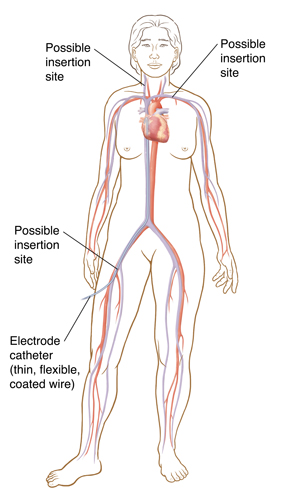Electrophysiology Study (EPS)
An electrophysiology study (EPS) is a test that checks the heart's electrical system for abnormal heartbeats or heart rhythms. For the test, wires are placed in the heart to measure electrical activity. An EPS is done by a healthcare provider who specializes in heart rhythm evaluation and treatment (cardiac electrophysiologist). The test can be used to:
-
Assess your heart's electrical system
-
Screen for heart rhythm problems (arrhythmias)
-
Guide treatment for arrhythmias
-
Assess the risk for arrhythmia in certain heart conditions
Before the procedure
-
Tell your provider which medicines you take. This includes prescription and over-the-counter medicines. It also includes vitamins, herbs, and other supplements. Ask if you should stop taking any medicines before the procedure. This is especially true for blood thinners or medicines that affect heart rate or rhythm.
-
Have any routine tests that your provider advises. These might be blood tests or heart rhythm tests such as an electrocardiogram (ECG) or a Holter monitor.
-
Follow all directions you're given for not eating or drinking before the procedure.
During the procedure
-
The study takes about 1 hour. It may take longer if any treatment is done.
-
You'll be given medicine through an IV (intravenous) line to help you relax.
-
Your skin is numbed with a local anesthetic. This can be on the right groin, the left groin, or both.
-
The provider then puts 1 or more thin tubes (catheters) into a vein or artery in your groin.
-
Using pulsed X-ray called fluoroscopy or other non-X-ray navigation systems, your provider will then put wires into certain places in the heart. This is to record the heart's electrical activity.
-
The heart's electrical activity will be measured carefully. Pacing and stimulation of the heart will then be done. This includes adding additional heartbeats in a controlled way to test the heart's electrical system. It also tests if an abnormal heart rhythm can be made to happen (induced).
-
Medicines that stimulate the heart can be used to help induce an abnormal heart rhythm.
-
Once your provider gets the needed information, they'll remove the wires.
-
The catheter will be removed from the groin.
-
Pressure is applied to the insertion site to stop any bleeding. Sometimes closure devices within the skin are used to prevent bleeding.

After the procedure
-
You'll be asked not to move your leg that had the catheter for 2 to 6 hours after the procedure. You'll need to lie still in bed.
-
A nurse will check the insertion site and watch your vital signs.
-
After the study, you may stay overnight. Or you may go home the same day. This will depend on the EPS results, as well as the reason for the test. Have someone give you a ride home. It's not safe to drive after you've been given sedatives or pain medicines.
Call 911
Call 911 right away if you have any of these:
-
Shortness of breath
-
Feeling dizzy, lightheaded, or fainting
-
Chest pain
-
Sudden increase in swelling at the puncture site
-
Severe pain, coldness, numbness, or a bluish color in the leg or arm that held the catheter
-
Bleeding at the insertion site that doesn't slow down when you press hard on the site
When to call your healthcare provider
Call your healthcare provider right away if you have any of these:
-
The insertion site has signs of infection (pain, increased swelling, redness, bleeding, or leaking fluid)
-
Fever of 100.4°F (38°C) or higher, or as advised by your provider
Online Medical Reviewer:
Ronald Karlin MD
Online Medical Reviewer:
Stacey Wojcik MBA BSN RN
Online Medical Reviewer:
Steven Kang MD
Date Last Reviewed:
3/1/2024
© 2000-2024 The StayWell Company, LLC. All rights reserved. This information is not intended as a substitute for professional medical care. Always follow your healthcare professional's instructions.